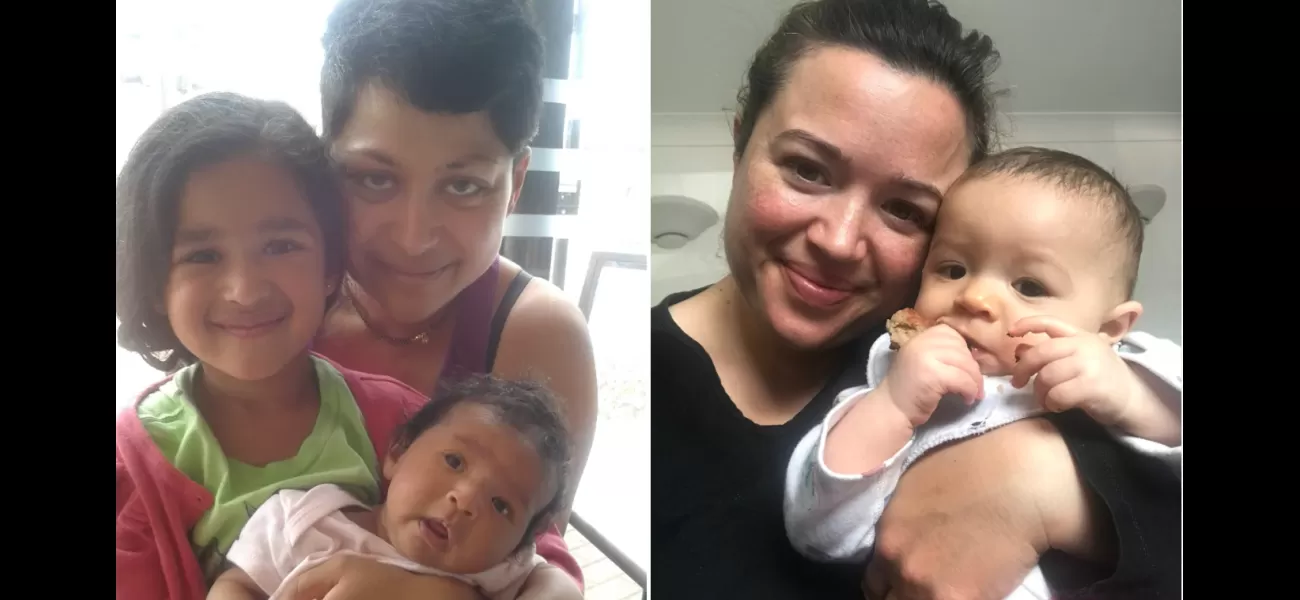I believed my kids would be better off without me.
30% of women face perinatal mental health issues.
March 18th 2024.

Neela Prabhu and Lucy Wilson, two mothers who have both experienced perinatal mental illness, share their stories. For Lucy, the intrusive thoughts began after her son, Sebastian, was born. She was constantly on high alert and saw danger everywhere. She couldn't even relax while giving her son a bath or a cup of tea, as she had thoughts of him getting severely injured. It was a terrifying experience, but luckily, her son was never in any real danger due to her carefulness.
Motherhood is often portrayed as a beautiful and magical time, but in reality, one in three women in the UK suffer from perinatal mental health problems during pregnancy or the first year after giving birth. These conditions can be very distressing and include Post Natal Depression, maternal OCD, and post-traumatic stress disorder.
For Lucy, a 43-year-old company founder from Hampshire, her first pregnancy was uneventful until her son Sebastian was born with a bowel condition and had to be rushed to the Neonatal Intensive Care Unit. This was the beginning of her struggle with intrusive thoughts and deteriorating mental health. As someone who loves to plan, the sudden change of events was overwhelming for Lucy. Her son needed multiple operations, and her anxiety levels skyrocketed.
Despite all the challenges, Lucy and her husband Ryland decided to have a second child, and their son Bertie was born in October 2019. However, he had silent reflux and barely slept, adding to Lucy's guilt for disrupting Sebastian's life with a new sibling. And just five months later, the pandemic hit, and everything became even more challenging. With her three-year-old unable to go to preschool and the family stuck in lockdown, Lucy found herself crying every day. But she didn't let it defeat her and instead channeled her determination into starting her own business to help others with their mental health.
After a nine-month wait, Lucy finally received CBT counseling, which has been helpful, but she was shocked by the long wait time. She hopes that more people will realize the importance of maternal mental health and that there will be more support and education available for women.
Georgina Sturmer, a counselor, emphasizes the need to speak out about perinatal mental health to break the stigma and normalize these conversations. She explains that the perinatal period is a time of significant changes and challenges, physically, hormonally, and emotionally. These changes can trigger mental health issues, especially with the added pressure of societal expectations. Sturmer urges women to vocalize their taboo thoughts and seek support if they are struggling.
Neela Prabhu and Lucy Wilson, two mothers, both experienced challenges with perinatal mental illness. Lucy recalls her struggle with intrusive thoughts after the birth of her son, Sebastian. She was constantly on high alert and saw danger everywhere, even in the simplest tasks like giving her son a bath or making a cup of tea. Despite her excessive caution, she couldn't shake off the fear that her son was at risk.
Motherhood is portrayed as a beautiful and magical experience, yet in the UK, one in three women face perinatal mental health issues during pregnancy or within the first year of giving birth. These can be extremely distressing and include conditions such as Post Natal Depression, maternal OCD, and post-traumatic stress disorder.
For Lucy, who is now 43 and a company founder from Hampshire, her first pregnancy seemed to be going smoothly until an emergency arose when her two-day-old son, Sebastian, had to be rushed to the Neonatal Intensive Care Unit due to a bowel condition. This experience triggered increasingly intrusive thoughts and caused her mental health to deteriorate.
"I was always a planner," Lucy explains, "I had made 100 meals before my baby was born, and we had to buy an extra freezer for the garage to store them all. But after Sebastian was born, my planning went out the window. He was in an unusual position in the womb, so I had to have a planned cesarean, which went well. However, just two days later, he became sick and had to undergo scans. Things escalated quickly, and he needed an operation five days later for Hirschsprung's disease, which meant his intestine wasn't functioning properly and he had to have a colostomy bag fitted."
After returning home two weeks later, Lucy's anxiety skyrocketed. Sebastian needed two more operations in the following months, and at seven months old, his colostomy bag was finally removed. However, by then, Lucy's mental health had taken a toll.
"I felt incredibly alone," she shares. "I didn't think anyone would understand the thoughts I was having, and I didn't know where to turn for help. It put a strain on my relationship with my husband, as it was the toughest thing we had ever gone through."
Despite everything, Lucy and her husband felt ready to expand their family, and their second son, Bertie, was born in October 2019. However, he had silent reflux and didn't sleep much, which only added to Lucy's guilt about disrupting Sebastian's life with a new sibling.
Then, just five months later, the COVID-19 lockdown began, and everything changed. Sebastian, then three, couldn't attend preschool, and Lucy found herself stuck in a never-ending cycle. "I cried every day until I realized I couldn't continue living like that," she says. "I was determined not to let this happen to anyone else, so I started my own business to help people take care of their mental health."
Lucy also finally received CBT counseling after being on a nine-month waiting list. "It has been beneficial, but I was shocked by the waiting time," she admits. "I hope people realize the importance of maternal mental health, and we need to provide more support and proactive education for women."
While those struggling with perinatal mental illness often feel isolated, the statistics show an increase in cases, highlighting the need to speak out and seek help. Counselor Georgina Sturmer says, "The more we talk about mental health, the more we can break the stigma and normalize these conversations. This can help us all feel lighter and understand that we deserve support during challenging times."
She adds, "Mental health problems can manifest in various ways during the perinatal period. It's a time of immense change, physically, hormonally, and emotionally. This can act as a catalyst for changes in our mental health. We are adjusting to changes in our bodies, identity, and relationships, and this can bring out underlying fears and worries. Our usual coping mechanisms may not be as effective, and the pressure to conform to society's expectations of motherhood can only worsen the situation."
Georgina emphasizes the importance of vocalizing these taboo thoughts and seeking help. Motherhood is a beautiful journey, but it can also be challenging, and it's crucial to prioritize one's mental health during this crucial time.
Motherhood is often portrayed as a beautiful and magical time, but in reality, one in three women in the UK suffer from perinatal mental health problems during pregnancy or the first year after giving birth. These conditions can be very distressing and include Post Natal Depression, maternal OCD, and post-traumatic stress disorder.
For Lucy, a 43-year-old company founder from Hampshire, her first pregnancy was uneventful until her son Sebastian was born with a bowel condition and had to be rushed to the Neonatal Intensive Care Unit. This was the beginning of her struggle with intrusive thoughts and deteriorating mental health. As someone who loves to plan, the sudden change of events was overwhelming for Lucy. Her son needed multiple operations, and her anxiety levels skyrocketed.
Despite all the challenges, Lucy and her husband Ryland decided to have a second child, and their son Bertie was born in October 2019. However, he had silent reflux and barely slept, adding to Lucy's guilt for disrupting Sebastian's life with a new sibling. And just five months later, the pandemic hit, and everything became even more challenging. With her three-year-old unable to go to preschool and the family stuck in lockdown, Lucy found herself crying every day. But she didn't let it defeat her and instead channeled her determination into starting her own business to help others with their mental health.
After a nine-month wait, Lucy finally received CBT counseling, which has been helpful, but she was shocked by the long wait time. She hopes that more people will realize the importance of maternal mental health and that there will be more support and education available for women.
Georgina Sturmer, a counselor, emphasizes the need to speak out about perinatal mental health to break the stigma and normalize these conversations. She explains that the perinatal period is a time of significant changes and challenges, physically, hormonally, and emotionally. These changes can trigger mental health issues, especially with the added pressure of societal expectations. Sturmer urges women to vocalize their taboo thoughts and seek support if they are struggling.
Neela Prabhu and Lucy Wilson, two mothers, both experienced challenges with perinatal mental illness. Lucy recalls her struggle with intrusive thoughts after the birth of her son, Sebastian. She was constantly on high alert and saw danger everywhere, even in the simplest tasks like giving her son a bath or making a cup of tea. Despite her excessive caution, she couldn't shake off the fear that her son was at risk.
Motherhood is portrayed as a beautiful and magical experience, yet in the UK, one in three women face perinatal mental health issues during pregnancy or within the first year of giving birth. These can be extremely distressing and include conditions such as Post Natal Depression, maternal OCD, and post-traumatic stress disorder.
For Lucy, who is now 43 and a company founder from Hampshire, her first pregnancy seemed to be going smoothly until an emergency arose when her two-day-old son, Sebastian, had to be rushed to the Neonatal Intensive Care Unit due to a bowel condition. This experience triggered increasingly intrusive thoughts and caused her mental health to deteriorate.
"I was always a planner," Lucy explains, "I had made 100 meals before my baby was born, and we had to buy an extra freezer for the garage to store them all. But after Sebastian was born, my planning went out the window. He was in an unusual position in the womb, so I had to have a planned cesarean, which went well. However, just two days later, he became sick and had to undergo scans. Things escalated quickly, and he needed an operation five days later for Hirschsprung's disease, which meant his intestine wasn't functioning properly and he had to have a colostomy bag fitted."
After returning home two weeks later, Lucy's anxiety skyrocketed. Sebastian needed two more operations in the following months, and at seven months old, his colostomy bag was finally removed. However, by then, Lucy's mental health had taken a toll.
"I felt incredibly alone," she shares. "I didn't think anyone would understand the thoughts I was having, and I didn't know where to turn for help. It put a strain on my relationship with my husband, as it was the toughest thing we had ever gone through."
Despite everything, Lucy and her husband felt ready to expand their family, and their second son, Bertie, was born in October 2019. However, he had silent reflux and didn't sleep much, which only added to Lucy's guilt about disrupting Sebastian's life with a new sibling.
Then, just five months later, the COVID-19 lockdown began, and everything changed. Sebastian, then three, couldn't attend preschool, and Lucy found herself stuck in a never-ending cycle. "I cried every day until I realized I couldn't continue living like that," she says. "I was determined not to let this happen to anyone else, so I started my own business to help people take care of their mental health."
Lucy also finally received CBT counseling after being on a nine-month waiting list. "It has been beneficial, but I was shocked by the waiting time," she admits. "I hope people realize the importance of maternal mental health, and we need to provide more support and proactive education for women."
While those struggling with perinatal mental illness often feel isolated, the statistics show an increase in cases, highlighting the need to speak out and seek help. Counselor Georgina Sturmer says, "The more we talk about mental health, the more we can break the stigma and normalize these conversations. This can help us all feel lighter and understand that we deserve support during challenging times."
She adds, "Mental health problems can manifest in various ways during the perinatal period. It's a time of immense change, physically, hormonally, and emotionally. This can act as a catalyst for changes in our mental health. We are adjusting to changes in our bodies, identity, and relationships, and this can bring out underlying fears and worries. Our usual coping mechanisms may not be as effective, and the pressure to conform to society's expectations of motherhood can only worsen the situation."
Georgina emphasizes the importance of vocalizing these taboo thoughts and seeking help. Motherhood is a beautiful journey, but it can also be challenging, and it's crucial to prioritize one's mental health during this crucial time.
[This article has been trending online recently and has been generated with AI. Your feed is customized.]
[Generative AI is experimental.]
0
0
Submit Comment





